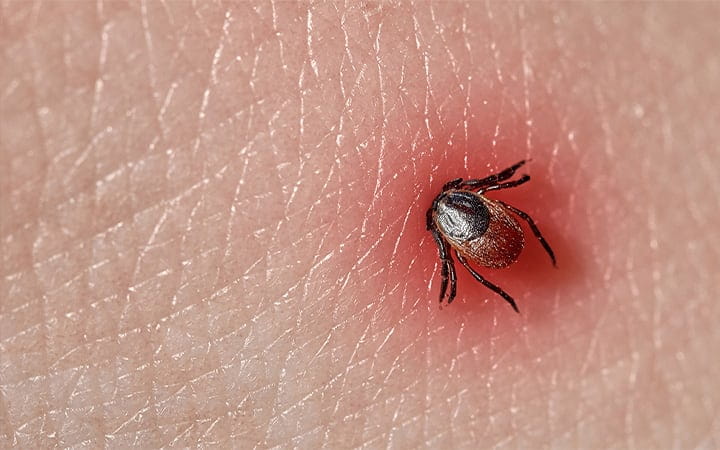Alpha-Gal Syndrome: The Meat Allergy Caused by a Tick Bite
September 02, 2025

A meat allergy from a tick bite? It sounds like the stuff of science fiction, but it’s on the rise across the United States. Alpha-gal syndrome is triggered by a bite from the Lone Star tick and results in an allergic reaction to red meat, dairy and other products made from mammals.
While only two dozen alpha-gal cases were documented in 2009, the migration of the Lone Star tick across the south, midwest and northeast states has resulted in a staggering 450,000 people now affected.
“This is one of the most unusual allergy conditions we’ve seen, because it’s not a typical reaction to a protein,” explains Nancy Wasserbauer Kingston, DO, an allergy and immunology specialist at University Hospitals. “It really turns how we’ve always thought about food allergies upside down.”
A Chain Reaction Makes Dinner Dangerous
Ticks feed on the blood of mammals such as deer and cattle, which contains a carbohydrate called galactose-α-1,3-galactose, or alpha-gal. When the tick bites a person, it can transfer the molecule into their bloodstream. The immune system may begin producing antibodies against alpha-gal, which sets the stage for an allergic reaction to food – particularly red meat.
What makes the alpha-gal allergy confusing is the timing. Unlike peanut or shellfish allergies, where reactions typically appear within minutes, alpha-gal reactions are delayed—usually six to eight hours after eating beef, pork, lamb or other meat products. “Many patients wake up in the middle of the night, hours after dinner, with a sudden allergic reaction,” says Dr. Wasserbauer. “At first, they may think it’s food poisoning.”
Alpha-gal symptoms can range from mild to severe, and often include hives, itching, facial swelling, shortness of breath, wheezing, nausea, vomiting, diarrhea, dizziness and even low blood pressure. Some patients experience full anaphylaxis, a potentially life-threatening reaction. Others may mistake their symptoms for gastrointestinal illness and go undiagnosed until the pattern repeats.
When the Condition Changes Course
While there is no treatment, one of the most hopeful aspects of alpha-gal syndrome is that, unlike lifelong food allergies such as peanut or shellfish, sensitivity may decrease with time. “We’re starting to see that if people strictly avoid red meat, their antibody levels can decrease,” says Dr. Wasserbauer. “Some patients may eventually tolerate meat again, but determining that requires close monitoring and an in-office food test.”
Because symptoms are delayed, a patient undergoing the test has to eat red meat in the doctor’s office first thing in the morning and remain under observation for the rest of the day. This cautious approach ensures patients can be safely monitored if a reaction develops.
Patients with alpha-gal can also react to dairy products, gelatin and even some medications. For example, the cancer drug cetuximab has been linked to severe reactions in alpha-gal–sensitized patients. Researchers are working to better identify animal-derived ingredients in medications that could cause problems. “It’s not just about food,” notes Dr. Wasserbauer. “This allergy can affect how patients respond to certain drugs, so awareness is critical.”
Staying Safe and Spotting the Signs
Experts believe the explosion of cases is linked to climate shifts and deer migration patterns, which allow Lone Star ticks to thrive in new areas. “As ticks travel on deer and other animals, the conditions they cause travel too,” explains Dr. Wasserbauer.
Preventing alpha-gal means avoiding tick bites in the first place. Protective steps include:
- Wearing long sleeves and pants tucked into socks when outdoors
- Using repellents that contain DEET or permethrin
- Checking your body and clothing for ticks after coming inside.
- Pets should also be checked regularly, since they can carry ticks indoors.
“The Lone Star tick is quite small, so you may not even realize you’ve been bitten,” Dr. Wasserbauer warns. “That makes prevention measures even more important.”
For people who develop symptoms such as hives, swelling or sudden stomach illness several hours after eating red meat, especially after recent outdoor activity, an allergist can help determine whether alpha-gal syndrome is the cause.
“The key is awareness,” says Dr. Wasserbauer. “This condition may be underrecognized, so it’s important that patients share their full history—including outdoor exposure and timing of symptoms—to help their doctors make the right diagnosis.”
If you are diagnosed with alpha-gal, stresses Dr. Wasserbauer, there’s hope you might find your way back to the meat and dairy aisles with time. “Don’t assume this is lifelong—stay in touch with your allergist,” she says. “Research is ongoing, and some people may lose their sensitivity. That allows us to retest and possibly expand the diet safely in the future.”
Related Links
University Hospitals allergy and immunology specialists provide expert diagnosis and care for patients with food allergies and other immune system conditions.


